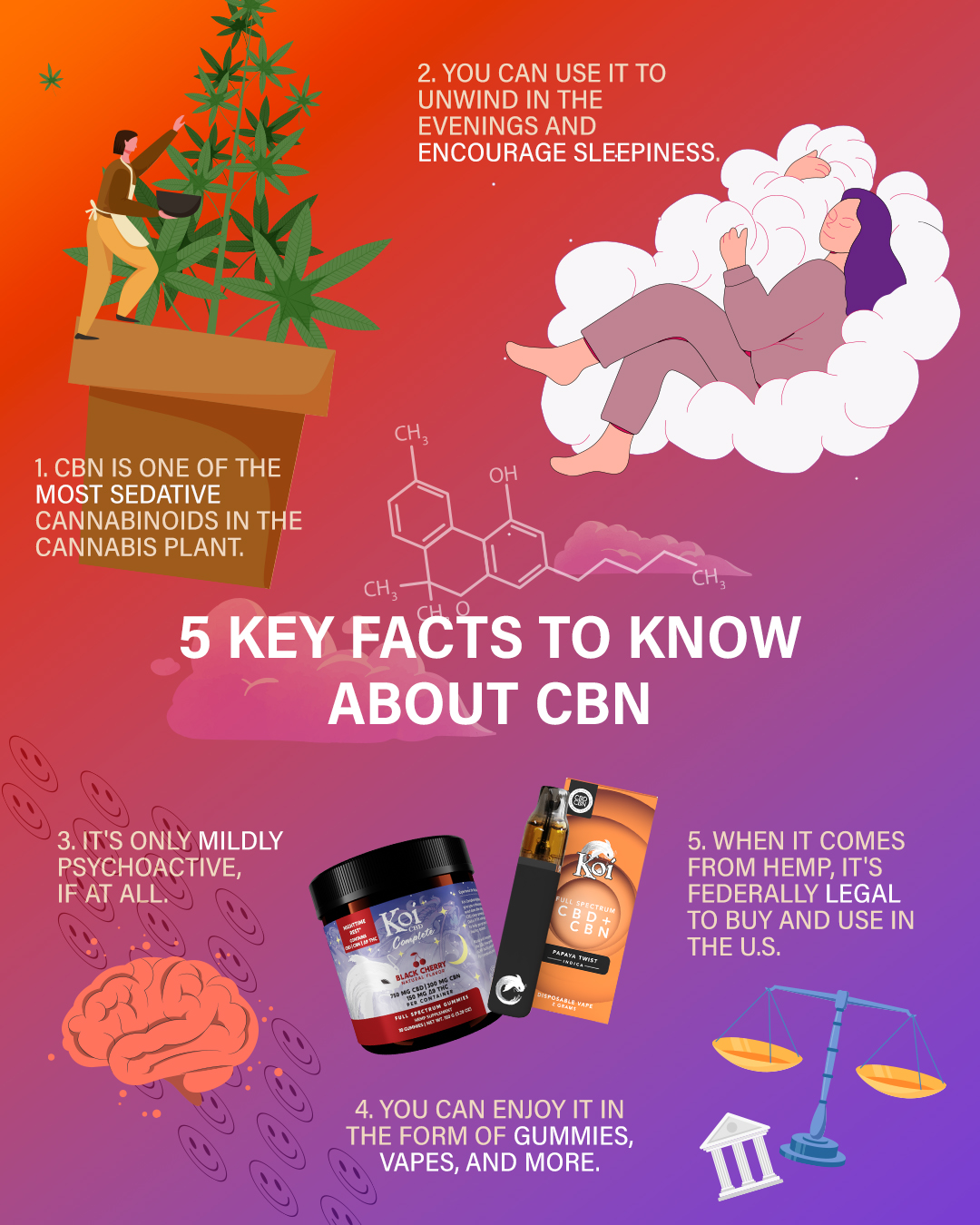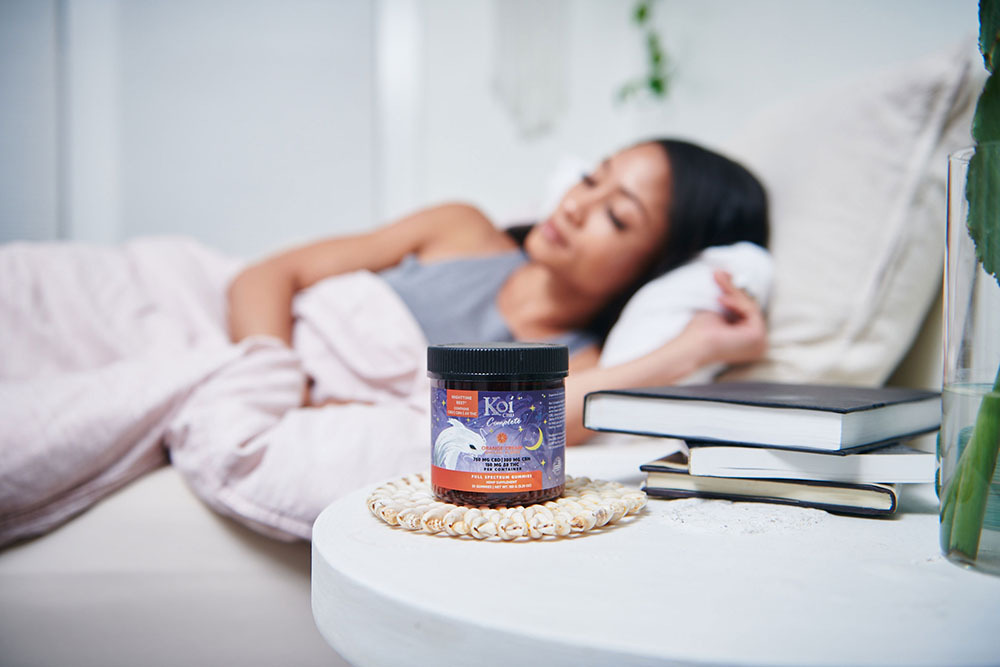Struggling with sleepless nights? Known as the "sleepy cannabinoid," CBN has relaxing and soothing properties that can help you fall asleep and stay asleep so you wake feeling rested. Get to know this powerful hemp compound and how to experience its sleep-boosting power best.
Key takeaways:
- CBN is one of the most sedative cannabinoids in the cannabis plant.
- It's mainly used to unwind in the evenings and encourage sleepiness.
- CBN is only mildly psychoactive, if at all.
- As a hemp compound, CBN is federally legal in the United States.
The hemp plant is packed with valuable compounds that have the potential to help you feel and function better. For most, CBD is their go-to. But there is so much more hemp has to offer. One such offering is CBN and its powerful sleep-promoting properties.
While CBD and CBN have similarities, they also have stark differences that you'll want to know about if you consider adding CBN to your evening routine. And if you thought CBD products were helpful for a better night's sleep, wait until you experience CBN.
As is often the case with hemp cannabinoids, you likely have questions about CBN. Here we break down what CBN is and how it's made, how it works and differs from other cannabinoids, and whether there are any concerns with using it to promote more restful sleep.
What is CBN?
CBN is short for cannabinol, one of more than 100 cannabinoids produced within the hemp plant. Despite the similarities in the name, CBN is not to be confused with cannabidiol or CBD.
CBN is considered mildly psychoactive, but it doesn't produce the type of euphoria associated with cannabis use. Instead, it can cause a sense of drowsiness and sedation, which may help you sleep.
There are various CBN products if you're looking to add CBN to your routine. Most people prefer enjoying sweet-tasting CBN gummies an hour or so before bed, but CBN vapes offer faster effects.
While CBN has only recently become available to buy, scientists have known about it for over a century. CBN was the very first cannabinoid discovered in 1899. However, because it's a complex cannabinoid and its extraction process is complicated, it's been overlooked for more easily accessible cannabinoids like THC and CBD.
If recent trends are anything to go by, it is safe to say that CBN has earned its time in the spotlight and is likely to reach the same level of attention that CBD and THC have gotten over the years.

Where Does CBN Come From?
CBN is one of the most abundant naturally occurring cannabinoids in the Cannabis Sativa plant. It’s produced in the plant’s latter stages, as THC degrades to leave behind CBN.
This is why CBN is most common in older plants or plants exposed to heat and oxidation. These two factors are also the catalyst used to produce CBN. Therefore, the older a plant is, the higher the quantity of CBN it makes.
The process in which CBN is created is called decarboxylation, which involves the removal of carbon dioxide. Unlike CBD and CBG, which exist independently in the cannabis plant, CBN is derived from THCA or tetrahydrocannabinolic Acid when decarboxylated by heat.
CBN can be extracted from hemp and marijuana stains because both contain THC. But, although CBN is produced from degraded THC, it is generally non-intoxicating, much like CBD.
How Are CBN Products Made?
The process of making CBN products starts with extracting CBN from the cannabis flowers that have been dried and cured. The extraction process removes the plant material leaving behind a concentrated extract containing CBN.
Depending on the product being made, the hemp extract containing high levels of CBN may be processed to remove all extraneous chemicals and terpenes to produce CBN isolate. Manufacturers can then infuse this highly concentrated powdered form of CBN into products, such as sleep gummies.
The extract can also be diluted using a type of carrier oil. Common carrier oils include coconut, hemp seed, and olive oil. The result is a potent CBN oil that can be used for various purposes.
While there are CBN-only products, in many cases, the cannabinoid is combined with others to maximize its overall benefits. Evidence suggests that the plant's cannabinoids and other compounds work together synergistically.

How Does CBN Work?
Like every cannabinoid, CBN delivers its benefits by interacting with your body's endocannabinoid system (ECS).
Your ECS is an internal regulatory system responsible for maintaining balance in a long list of internal functions – from sleep habits to mood, immune response, temperature, memory, and much more. It's made up of a network of receptors around the body that receive messaging when cannabinoids like CBN bind with them. These primary receptors are called CB1 and CB2.
CBN acts on CB1 receptors like THC but at a much milder strength. Scientists suggest that CBN has a stronger affinity for CB2 receptors.
Most of the research surrounding CBN is still in its infancy, and more studies are needed to explain how it works in the body fully and if it impacts other receptors and hormones. However, we do have anecdotal reports and previous knowledge of cannabinoids. We will learn more about how CBN works in the body with more research and information.
Potential Benefits of CBN in the Body
Although more studies are needed, research on CBN so far is promising. Anecdotally, most people who have already tried CBN have given it gleaming reports. The types of potential CBN benefits they report include:
Sleep support
Encouraging better and more restful sleep is the most reported benefit of CBN, which is why CBN has grown so popular. Most people praise its excellent ability to help induce sleepiness, which can prove helpful if your mind races or you have trouble unwinding in the evenings. While more research is required, CBN may have soothing properties that ease your mind and increase your sleep quality.
Natural relief support
Many cannabinoids have demonstrated they can help ease tension and encourage feelings of relief, and CBN is not any different. In addition, early evidence suggests that CBN can be helpful when dealing with muscle and joint soreness. These findings were even more promising when CBN and CBD were used together.
Healthier immune response support
Based on studies, CBN may be beneficial in supporting a healthier immune system response. This is not surprising, as CBN has a stronger affinity for the endocannabinoid system's CB2 receptors, which are mainly found in immune tissues and linked to various immune-related functions.
Healthier appetite support
CBN may support healthier eating habits. As a by-product of THC, it's thought to carry over some benefits, one of them making the process of eating more enjoyable. You may prefer CBN over THC because it can help positively influence appetite behaviors without causing noticeable euphoria.
Help ease feelings of stress
CBN fans swear by its calming and relaxing effects. It's possibly one of the reasons why it might help you sleep better at night. If you struggle with a busy mind and uneasiness, it might be what you need to enjoy a restful night finally.
Is CBN Different from CBD?
Many hemp cannabinoids have similar names and often share similar properties and effects. The same is the case with CBN and CBD.
So, is CBN the same as CBD? The short answer is no. But they do share some characteristics.
First, both compounds are non-euphoric, which means neither produces noticeable uplifting effects. Anyone who appreciates CBD will find that music to their ears. Another similarity is they are both federally legally available because they come from hemp.
But beyond that, you should be aware of the differences between the two compounds, which could help you decide how best to fit each into your cannabinoid routine.
Some of these differences include the following:
The volume of research and studies
As one of the most abundant cannabinoids, CBD has enjoyed more years of research and studies than CBN. Although there's a lot about CBD that is still unknown, studies have uncovered a lot and helped to confirm most of the anecdotal reports about the benefits of CBD.
Although CBN has been around for over a century, comparatively little research has explored its benefits and uses. Most of what we know is from the overall understanding of cannabinoids that we've generated, expert opinions, and consumer reports. But given that it has now gone mainstream and that CBN products are now more readily available, research and studies into CBN could soon pick up.
Effects
Your experience with CBD and CBN can vary from someone else's. However, some effects are commonly reported with the two compounds and some overlap. These include providing a centered sense of calm and promoting balance. However, CBD usually encourages overall wellness without drowsiness and can be taken at any time. At the same time, CBN tends to have sedative properties that make it best for nighttime or evening use.
Price
While not always the case, you may find that some CBN products cost more overall than CBD products. This is because CBN is only found in minimal quantities, making it more expensive to extract. It doesn't help that it also requires a unique extraction method that can be more time-consuming than CBD extraction.

Are There Any Known Side Effects of CBN?
CBN is well-tolerated by most people. Most people who try CBN don't report any problems. However, there are possible side effects when taking any cannabinoid. In rare cases, a few mild and temporary side effects can occur, such as drowsiness, possibly because of the relaxing effects. Other potential side effects include dizziness and nausea.
If you experience any side effects, they are likely to be mild and temporary, and in most cases, you can address them the next time by lowering your CBN intake. Also, it's always recommended to visit your doctor before starting any new cannabinoid routine.
Final Thoughts on CBN
There you have it! Everything you need to know about CBN to start taking it like a seasoned hemp fan. In summary, CBN is like other cannabinoids in many ways. It works through the endocannabinoid system. It has most of the same benefits that other cannabinoids are known for, but CBN is one of the most widely used cannabinoids for better sleep.
CBN isn't as widely available as CBD or THC, but you can find reliably high-quality CBN products from our online CBD shop. Discover more about CBN and hemp's other cannabinoids on the Koi blog.






